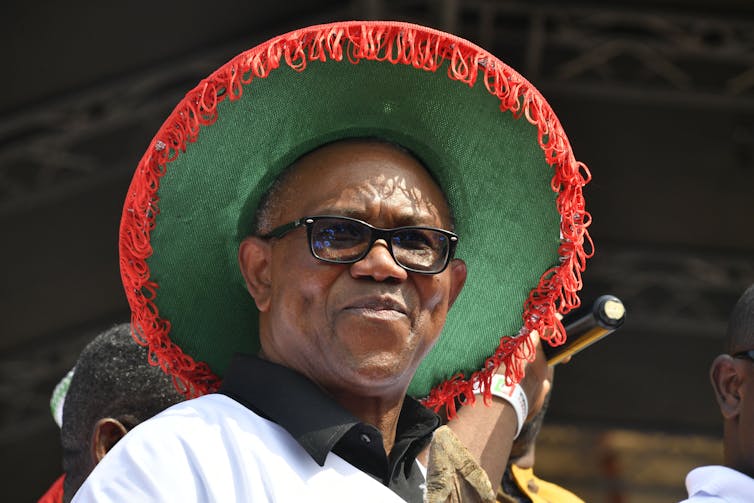
Kester Onor, Covenant University
Obi-dient is the word in town for the Nigerians who support Peter Obi, a former governor of Anambra State, south-east Nigeria. To them, Obi is the best candidate for the country’s presidency.
A look at the development of Obi’s character reveals discipline, responsibility, prudent management of resources and a positive impact on society.
In secondary school, he was engaged in trading to make money. He is known for his “egg principle”: that even one egg for sale should be carefully guarded because losing it meant the loss of his profit in that venture. Now he is renowned for prudence and financial discipline.
Obi’s emergence
Obi represents the aspirations of the teeming but marginalised Nigerian youth population. He symbolises the voice of the underprivileged who yearn for a better Nigeria where justice, equity, fairness and respect for human rights will be sacrosanct.
As a political scientist, I think Obi’s candidacy represents a total departure from the old order to people-centred leadership oriented towards development and national rebirth.
The unwillingness of the Peoples Democratic Party to cede its presidential ticket to the south-east region of Nigeria and the acrimonious relationship among the party’s leaders propelled Obi’s defection to the Labour Party in May 2022.
His emergence as Labour Party’s presidential candidate has attracted young people to rally around the Obi-dient call. There is a distinct possibility that Obi’s candidacy could be the “third force” that upstages the two dominant political parties. These are the All Progressives Congress and Peoples Democratic Party.
His entrance on the platform of a relatively unpopular party took many Nigerians by surprise. Past presidents have emerged from the two major parties. But disunity has deepened under the Muhammadu Buhari government. Insecurity remains a challenge and there’s a shortage of essential goods and services.
His early days
Obi was born on 19 July 1961 in Onitsha, south-east Nigeria. He attended Christ the King College, Onitsha, where he completed his secondary school education. He was admitted to the University of Nigeria in 1980 and graduated with a BA (Honours) in philosophy in 1984. He concentrated on his businesses, which grew to make him an influential player in the corporate world. He also sharpened his entrepreneurial and managerial competencies at Columbia, Harvard, London School of Economics and Oxford.
Seeking a wider platform to serve society, he contested the governorship of Anambra State in 2003 but was denied victory. He challenged his loss in court, shunned all manner of “settlements” and intimidation and regained his electoral mandate through the courts.
Barely six months in office, he was impeached by the Mike Balonwu-led House of Assembly. The first charge was that he had gone against the constitution and renovated the destroyed Government House for far less than was in the budget. The court later reinstated him.
He did not offer his friends appointments.
Among his achievements as governor were extensive road construction, and the return of schools to missionaries who had established them. Building on the foundations laid by Chris Ngige, his predecessor, Obi gave the state the best road network in Nigeria. His resolve also ushered in a rebirth of education and improved health care facilities in Anambra State.
Anambra is not Nigeria
Obi’s critics say that his Anambra State governance experience is not enough for him to seek Nigeria’s presidency. They point to the state’s size – 21 local government areas – unlike the behemoth called Nigeria. Anambra was created in 1991 by the military junta in power then. Nearly all its people speak the Igbo language.
The small scale of operations in Anambra State could have been a factor in his government success, and he will need greater dexterity in leading Nigeria if elected. His micro-management of affairs in the state is impossible at the federal level and this might make things tough for him as president.
His youthful supporters might also be his candidacy’s weakness. While 71 million young Nigerians (under 50 years old) registered to vote in the elections, out of the total of 93.5 million, they will only favour Obi if they vote massively in the election.
This is the first time in Nigeria’s contemporary political history that young people are driving a person’s presidential quest. Nobody knows how it will turn out. Political movements driven by young people like Y’en a Marre in Senegal, Balai Citoyen in Burkina Faso, or Filimbi in the Democratic Republic of the Congo have met with relatively little success. However, the recent emergence of President William Ruto in Kenya’s presidential election has shown that some of Africa’s youth are making their mark on the continent.
Whatever happens, Nigerian youth have written their names boldly in the political annals of their country by establishing the Obi-dient political movement.![]()
Kester Onor, Lecturer, Department of Political Science and International Relations, Covenant University
This article is republished from The Conversation under a Creative Commons license. Read the original article.

